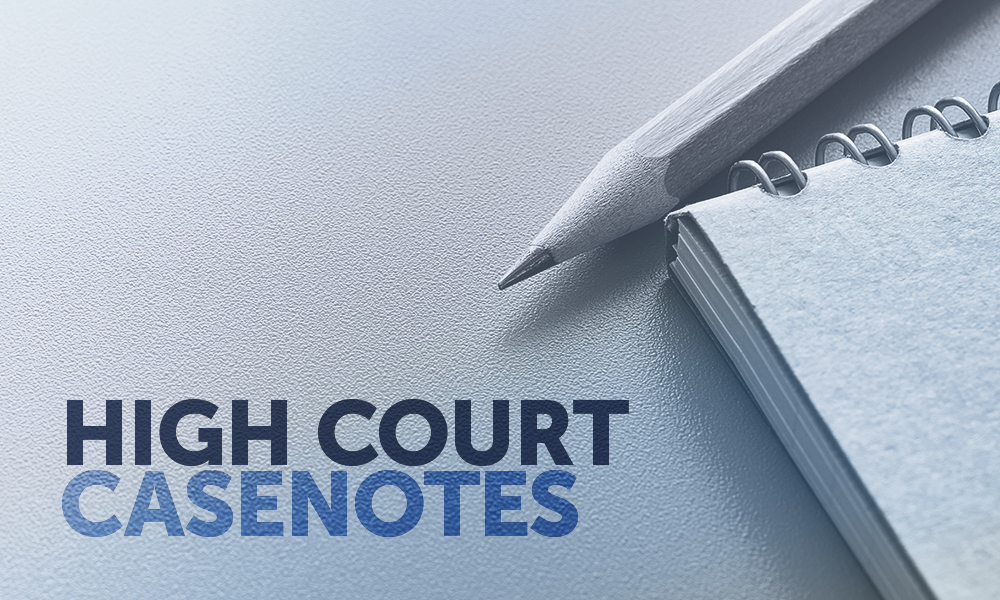In Roy v O’Neill [2020] HCA 45 (9 December 2020) the High Court was required to consider whether a police officer was trespassing on private property when he administered a breath test, the results of which were used in evidence against the appellant (Ms Roy).
A domestic violence order (DVO) was issued against Ms Roy out of the Local Court of the Northern Territory of Australia. The purpose of the DVO was to protect Ms Roy’s partner, Mr Johnson.
The DVO restrained Ms Roy from being in the company of Mr Johnson, or at a place where he lived, when she was consuming alcohol. Some time after the DVO had been issued, Constable Elliott visited Mr Johnson’s home.
At the time, the police in the Northern Territory were engaged in a ‘proactive policing’ operation targeting domestic violence. Constable Elliott later gave evidence that he was concerned about Mr Johnson’s welfare. Mr Johnson lived in a unit in a public housing complex.
Constable Elliott entered the complex from the footpath and walked along one of the pathways, shared by the units, to the door of Mr Johnson’s unit. Constable Elliott knocked on the flyscreen door and, looking in, saw Mr Johnson seated on the couch and Ms Roy lying on the floor. Constable Elliott called Ms Roy to the door. As Ms Roy approached the door, she displayed signs of intoxication. Constable Elliott required Ms Roy to provide a breath test and Ms Roy complied. The machine gave a positive reading for alcohol and the results were subsequently used against Ms Roy in proceedings against her for breaching the terms of the DVO.
At trial, evidence of the breath test result was objected to. Constable Elliott asserted that when he took the breath sample, he was exercising power under reg. 6 of the Domestic and Family Violence Regulations (NT) (regulations).
Regulation 6 requires a defendant to comply with a reasonable direction by a police officer to submit to a breath test. For the direction to be reasonable, it is not necessary for the officer to suspect that the defendant has consumed alcohol.
But, importantly, the regulation does not authorise a police officer to enter private property. However, section 126(2A) of the Police Administration Act (NT) (Act) does authorise entry if the officer believes, on reasonable grounds, that a contravention has occurred.
The trial judge found that neither the regulations nor the Act gave Constable Elliott power to attend Mr Johnson’s home to check Ms Roy’s compliance with the DVO. The decision was overturned by the Court of Appeal of the Northern Territory. And the High Court, in a 3:2 split, upheld the Appeal Court’s decision.
Keifel CJ and Keane and Edelman JJ (the latter two justices in a joint judgment) considered that Constable Elliott was not a trespasser at the time that he administered the breath test. Their Honours noted at [11] and [66] that to lawfully enter private property permission to enter must first be given by the occupier. And that permission, their Honours observed, can be implied.
Citing Halliday v Nevill (1984) 155 CLR 1, their Honours explained at [14] and [68] that a (revocable) licence to enter will be implied to walk on a path or driveway for the purpose of lawful communication, or delivery, to any person on the property if access is unobstructed and there is no notice, or other indication, that entry is prohibited.
Their Honours considered that Constable Elliott lawfully entered onto the private premises because he used an unobstructed pathway to access the property for the lawful purpose of carrying out a welfare check. Keifel CJ at [19] also considered that when Constable Elliott saw Ms Roy in an intoxicated state, he had the requisite belief for the purposes of s126(2A) of the Act to remain on the property and require Ms Roy to provide a breath sample under reg. 6 of the regulations.
But Keane and Edelman JJ at [93] thought it unnecessary to decide whether the Act or regulations applied because it was an undisputed fact that Ms Roy had voluntarily provided a sample of her breath. Bell and Gageler JJ, in dissent, in a joint judgment redolent of the film The Castle opined, at [31] that “In the Australian way of thinking, a home is a sanctuary”.
Their Honours recognised at [34] that the implied licence can be invoked by a police officer. But their Honours considered at [40] that a police officer exceeds the limits of that licence if the officer has any conditional or unconditional intention of ordering the occupier to do anything. Their Honours concluded that Constable Elliott was a trespasser because they considered that he intended to take a sample of Ms Roy’s breath when he entered onto the property and, as such, he had exceeded the limits of the implied licence.
Dr Michelle Sharpe is a Victorian barrister practising in general commercial, real property, disciplinary and regulatory law, 03 9225 8722, email msharpe@vicbar.com.au. The full version of these judgments can be found at austlii.edu.au.












Share this article